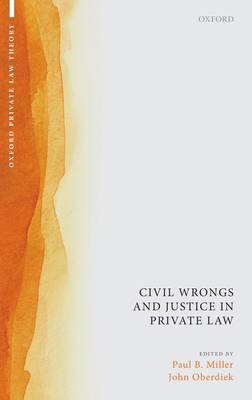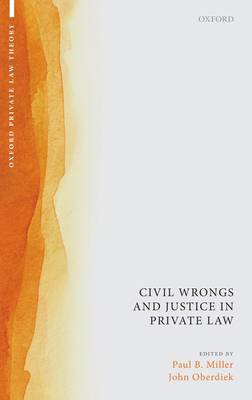
Bedankt voor het vertrouwen het afgelopen jaar! Om jou te bedanken bieden we GRATIS verzending (in België) aan op alles gedurende de hele maand januari.
- Afhalen na 1 uur in een winkel met voorraad
- In januari gratis thuislevering in België
- Ruim aanbod met 7 miljoen producten
Bedankt voor het vertrouwen het afgelopen jaar! Om jou te bedanken bieden we GRATIS verzending (in België) aan op alles gedurende de hele maand januari.
- Afhalen na 1 uur in een winkel met voorraad
- In januari gratis thuislevering in België
- Ruim aanbod met 7 miljoen producten
Zoeken
Civil Wrongs and Justice in Private Law
€ 290,45
+ 580 punten
Omschrijving
Civil wrongs occupy a significant place in private law. They are particularly prominent in tort law, but equally have a place in contract law, property and intellectual property law, unjust enrichment, fiduciary law, and in equity more broadly. Civil wrongs are also a preoccupation of leading general theories of private law, including corrective justice and civil recourse theories. According to these and other theories, the centrality of civil wrongs to civil liability shows that private law is fundamentally concerned with the expression and enforcement of norms of justice appropriate to interpersonal interaction and association. Others, sounding notes of caution or criticism, argue that a preoccupation with wrongs and remedies has meant neglect of other ways in which private law serves justice, and ways in which private law serves values other than justice. This volume comprises original papers written by a wide variety of legal theorists and philosophers exploring the nature of civil wrongs, their place in private law, and their relationship to other forms of wrongdoing.
Specificaties
Betrokkenen
- Uitgeverij:
Inhoud
- Aantal bladzijden:
- 552
- Taal:
- Engels
- Reeks:
Eigenschappen
- Productcode (EAN):
- 9780190865269
- Verschijningsdatum:
- 2/03/2020
- Uitvoering:
- Hardcover
- Formaat:
- Genaaid
- Afmetingen:
- 157 mm x 231 mm
- Gewicht:
- 771 g

Alleen bij Standaard Boekhandel
+ 580 punten op je klantenkaart van Standaard Boekhandel
Beoordelingen
We publiceren alleen reviews die voldoen aan de voorwaarden voor reviews. Bekijk onze voorwaarden voor reviews.








